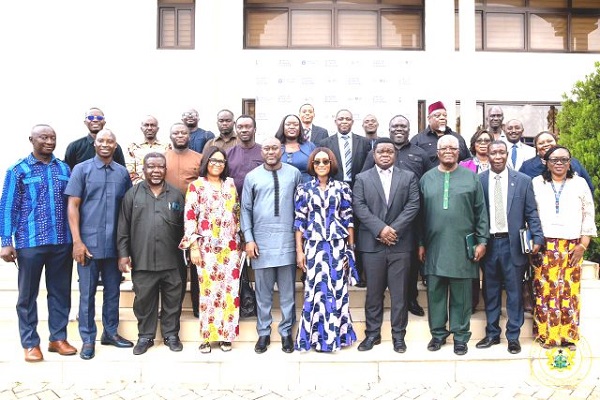The Ministry of Finance (MoF) and the University of Ghana (UG) in collaboration with the University of Ghana Business School (UGBS) and the Institute of Statistical Social and Economic Research (ISSER), have resolved to continue deliberation on the country’s finances to find solutions to the challenges of the nation’s economy.
The decision of the state and the academic institutions was contained in a joint communique issued after the maiden edition of the “Quarterly Economic Roundtable.”
It was organised jointly by the Ministry of Finance the University of Ghana, and the University of Ghana Business School (UGBS) held on Tuesday on the theme: “Restoring Macroeconomic Stability.”
Government commitment
Speaking at the event, the Minister of State at the Finance Ministry, Mrs. Abena Osei-Asare said the government was committed to ensuring that it maintains fiscal discipline even though 2024 is an election year which is usually characterised by excessive spending by government.
“The foundation of microeconomic stability is fiscal discipline. We (the government) are committed to implementing stringent fiscal policies to reduce deficits and manage public debts sustainably.
“We are also committed to transparency in public finance management, fully implementing the PFM Act and enhancing accountability mechanisms to ensure the efficient and effective use of public funds.
“There is always a high demand in election years for the government to overspend and we are committed to rationalising and containing expenditures especially in the third and fourth quarters to ensure that unbudgeted related expenditures are kept to the barest minimum or eliminated,” Mrs. Osei-Asare remarked.
Interventions
Mrs. Osei-Asare observed that there are several measures that the Bank of Ghana is implementing to control inflation to improve the purchasing power of Ghanaians.
She also indicated that various other interventions of government are yielding fruits and they will be pursued vigorously in the third and fourth quarters to consolidate the gains made.
The private sector, according to Mrs. Osei-Asare is a vital factor in the country’s quest to reduce its susceptibility to external pressures and everything will be done to improve same.
“Controlling inflation is critical for the purchasing power of Ghanaians and the Bank of Ghana continues to pursue critical measures to deal with this, the minister of state at the finance ministry.
“To reduce our vulnerability to external shocks, the government has continued to encourage private investment in key sectors such as agriculture, manufacturing, and technology through its flagship programmes such as the Planting for Food and Jobs (PFJ), One District, One Factory (1D1F), among others.
“It is by fostering industrialization that we can create jobs, boost exports, and enhance our economic resilience,” Mrs Osei-Asare added.
The Communique
In the communique, the Ministry of Finance and the University of Ghana indicated that they take “note the remarkable progress made towards stabilizing the economy, especially in the areas of fiscal adjustments, monetary policy coordination, the implementation of the IMF-supported Post Covid-19 Programme for Economic Growth (PC-PEG) as well as completing the domestic and external debt restructuring operations.”
They also acknowledged that “Ghana continues to face a confluence of challenges including geopolitical risks, sub-regional insecurities, multidimensional vulnerability, and climate change. We further recognize that the economy continues to experience significant debt service and energy cost, compounded by the effects of tight financing conditions, the sizeable fiscal risk from State Owned Enterprises (SOEs) and increased spending in response to multiple pressures including from organized labour.”





